Hans Urs von Balthasar’s Theological Trilogy (16 vols.)
Digital Logos Edition
Overview
Hans Urs von Balthasar was considered to be one of the most important Catholic writers and theologians of the twentieth century. His works include over 100 books and articles. He was devoted to addressing spiritual and practical issues of his time and resisted reductionism and the human focus of modernity, wanting Christians to challenge modern and philosophical assumptions.
Balthasar is most famously known for his sixteen-volume systematic theology which is divided into three parts: The Glory of the Lord, Theo-Drama, and Theo-Logic. The Glory of the Lord, the seven-volume work on theological aesthetics, introduces theology based on the contemplation of the good, beautiful, and true. The second part of the trilogy, the five-volume Theo-Drama, focuses on theodramatics, the actions of God and our human response. Balthasar particularly focuses on the events of Good Friday, Holy Saturday, and Easter Sunday. His soteriology, Christology, and eschatology are also developed in this series. The trilogy is completed with the three-volume Theo-Logic. Here, Balthasar describes the relation of the nature of Jesus Christ (Christology) to reality itself (ontology). Finally, in Epilogue Balthasar brings together the three parts of his trilogy by providing an overview and analysis of the preceeding 15 volumes. The Hans Urs von Balthasar Collection is sure to bring you insight, whether you’re wanting to discover new theological ideas or are seeking a deeper understanding of Christology, eschatology, Mariology, soteriology, and ontology.
- Contains works that have been translated from German to English
- Focuses on Christology, eschatology, Mariology, soteriology, and ontology
- Includes all Scripture references linked to the Bibles in your library
Balthasar’s most important works, at least in his own eyes, are not his writings but his foundations.
—Peter Henrici
. . . meeting Balthasar was for me the beginning of a lifelong friendship I can only be thankful for. Never again have I found anyone with such a comprehensive theological and humanistic education as Balthasar . . . and I cannot even begin to say how much I owe to my encounter with him.
- Title: Hans Urs von Balthasar’s Theological Trilogy
- Author: Hans Urs von Balthasar
- Publisher: Ignatius
- Volumes: 16
- Pages: 7,511
This title is included in the following collections
You can save when you purchase this product as part of a collection.
Hans Urs von Balthasar Collect...
$485.99$364.49Hans Urs von Balthasar Collect...
$802.51$481.49Verbum 5 Platinum Legacy Libra...
$1,499.99$1,499.99Modern Catholic Authors Bundle...
$2,499.99$1,874.99
- $2,999.99$2,099.99
- $5,017.57$2,249.99
- $2,999.99
- $2,999.99
- $2,999.99
- $2,999.99
- $4,749.99$3,324.99
- $3,999.99
- $10,417.33$4,687.49
- $4,749.99
- $4,749.99
- $10,999.99
- $23,999.99
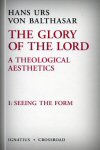
The work opens with a critical review of developments in Protestant and Catholic theology since the Reformation which have led to the steady neglect of aesthetics in Christian theology. From here, von Balthasar turns to the central theme of the volume: the question of theological knowledge. He re-examines the nature of Christian believing (here he quickly draws widely on such theological figures as Anselm, Pascal and Newman) which gives due place to the particular kind of ‘knowing’ which develops within the personal relationship to the believer to the God mediated through the revelation-form of Jesus Christ.
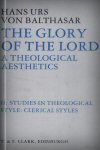
Henri de Lubac has described von Balthasar as “probably the most cultured man in Europe”. In this volume von Balthasar shows the extraordinary range of his knowledge and expertise in a series of essays designed to illustrate different ways in which theologians have shared their work. What he offers is “a typology of the relationship between beauty and revelation” which shows “that there neither has been nor could be any true great and historically fruitful theology which was not expressly conceived and born under the constellation of beauty and grace”. The volume offers a series of studies of representative figures from the earlier period of Christian theology, including Irenaeus, Augustine, Denys, Anselm, and Bonventura.
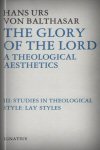
In this volume von Balthasar turns to the works of the lay theologians, the poets and the philosopher theologians who have kept alive the grand tradition of Christian theology in writings formally very different from the works of the Fathers and the great scholastics. This volume contains studies of Dante, John of the Cross, Pascal, Hamann, Soloviev, Hopkins, and Peguy.
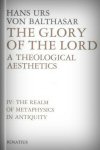
In this fourth volume of his magnum opus, von Balthasar considers the metaphysical tradition of the contemplation of being. He provides major studies of Homer, the Greek tragedians, Plato, and Plotinus and the development of this tradition in the Middle Ages. He then explores the analogy between the metaphysical vision of the being and the Christian vision of the divine glory of the Trinity. The book is a remarkable attempt to rediscover the ancient vision of being in all its awesomeness as the context within which the specifically Christian vision, rooted in God’s gracious self-revelation, took form and was expressed.
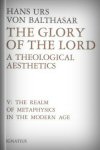
In this second volume on the metaphysical traditions of the West, von Balthasar presents a series of studies of representative mystics, theologians, philosophers, and poets and explores the three main streams of metaphysics which have developed since the ‘catastrophe’ of Nominalism. The way of self-abandonment to the divine glory is traced through figures like Eckhart, Julian of Norwich, Ignatius, de Sales; the attempt to relocate theology in a recovery of antiquity’s sense of being and beauty through figures like Nicholas of Cusa, Holderlin, Goethe, Heidegger; the metaphysics of spirit through Descartes, Leibniz, Spinoza, and the Idealists. The strengths and weaknesses of these ways are relentlessly exposed. The volume ends with the search for the Christian contribution to metaphysics.
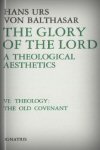
This volume initiates von Balthasar’s study of the biblical vision and understanding of God’s glory. Starting with the theophanies of the Patriarchal period, it shows how such glory is most fully expressed in the graciousness of the covenant relationship between God and Israel. But the breaking of that relationship by Israel means that in the later books of the Old Testament, the divine glory is seen in God’s willingness to bear with his people in the dark side of their history. There is no final version of God’s glory in the Old Testament. In the 500 years before Christ, the Covenant relation is more of an idea than reality. The vision of the transcendent glory of God which is developed in the later writings is only fragmentary. It will find its strange and unexpected fulfillment in the new Covenant.
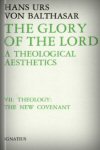
In this final volume of his great work, von Balthasar reflects on the New Testament vision of God’s revelation of his glory in Christ. This divine ‘appearing’ is grounded in the self-emptying of the eternal logos in the incarnation, cross, and descent into hell. Christ is the man who represents God and is also God; He is a symbol of the world and is also the world. He dies, but in dying rises into the eternal life of God. It is in Christ’s incarnation and resurrection that the Christian vision is truly expressed and the joining of God and the world in the new and eternal covenant is realized.
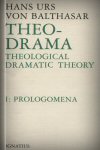
This is the introduction to the second part of the trilogy which is von Balthasar’s major work. The Glory of the Lord approaches revelation from the standpoint of the beautiful. The final part of the trilogy, the Theo-Logic, will treat Christian revelation from the standpoint of the true.
In this first volume von Balthasar shows how many of the trends of modern theology (e.g. “event”, “history”, “orthopraxy”, “dialogue”, “political theology”) point to an understanding of human and cosmic reality as a divine drama. He will then consider objections to such a theological dramatic theory and also the relationship between the Church and the theater. This volume assembles the materials and the themes that will make it possible in subsequent volumes to develop this theological dramatic theory.
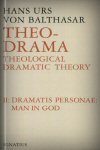
The first volume of this series surveyed the great world dramatists to gather concepts and ideas to apply to the real stage, which is the universe God has made and centered into himself as an actor. This volume describes the actors, the dramatis personae. This is his theological anthropology concerning man, his freedom and destiny in the light of biblical revelation. Von Balthasar is concerned here with the dramatic character of existence as a whole, approaching the topic through a consideration of the various conditions and situations of mankind as a drama that involves both the Creator and His creatures.
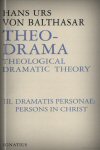
The third volume of Theo-Drama is considered the most central book of von Balthasar’s entire theological project. Structurally it is the middle volume of the middle part of his theological trilogy: Glory of the Lord, Theo-Drama, and Theo-Logic. More significantly, it contains von Balthasar’s synthetic treatment of the central mysteries of the Catholic Faith: Christ, Mary, the Church, man, and the Trinity.
The various elements of von Balthasar’s theological reflection converge here, and here as nowhere else one can find the systematic elaboration of his Christology, Mariology, ecclesiology, anthropology and Trinitarian doctrine. It is both a one-volume compendium of this theology and a key to his trilogy and other writings.
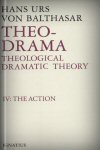
Having presented his Christology and Mariology under the sign of the "Dramatis Personae" in volume 3 of Theo-Drama, von Balthasar now turns to the action of the divine drama itself. Here we find his soteriology, where time, freedom, history, power, sin, conflict are seen in the light of the Cross, the culmination of the action and passion of God and man.
As Balthasar expresses it in the conclusion to his preface: here “we discern the unity of ‘glory’ and the ’dramatic’. God’s glory, as it appears in the world—supremely in Christ—is not something static that could be observed by a neutral investigator. It manifests itself only through the personal involvement whereby God himself comes forth to do battle and is both victor and vanquished. If this glory is to come within our range at all, an analogous initiative is called for on our part. Revelation is a battlefield. Those who do battle on it can only be believers and theologians, provided they have equipped themselves with the whole armor of God (Eph 6:11).”
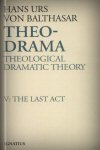
This is the final volume of this series on "theological dramatic theory" by the great 20th century theologian Balthasar. This series is the second part of Balthasar’s trilogy on the good, the beautiful, and the true which is his major work. The first series in the trilogy is The Glory of the Lord, and following this Theo-Drama series will be Theo-Logic.
In this series “the good” has been the focus. Balthasar maintains that it is in the theater that man attempts a kind of transcendence to observe and to judge his own truth about himself. He sees the phenomenon of theater as a source of fruitfulness for theological reflection on the cosmic drama that involves earth and heaven. This fifth volume is Trinitarian, focusing on the mystery of God. He draws heavily on Scripture and many passages from the works of the mystic Adrienne von Spyer. Some of the topics covered include “A Christian Eschatology”, “The World is from the Trinity”, “Earth moves Heavenward”, and “The Final Act: A Trinitarian Drama.”
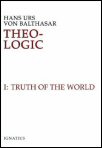
Theo-Logic is the third and crowning part of the great trilogy of the masterwork of theologian Hans Urs von Balthasar, following his first two parts, The Glory of the Lord and Theo-Drama. This third part of the trilogy focuses on theological “logic” and what role it plays in the event of God’s self-revelation through the Incarnation of the Logos and the outpouring of the Holy Spirit.
The Truth of the World searches to uncover the structures that characterize the truth of finite being, while keeping in mind that this truth cannot be explained outside of its circumincessive relation to the other transcendentals. This volume investigates truth as nature, freedom, mystery, and participation.
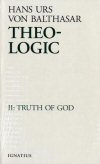
Truth of God concentrates on the truth that God has made known to us by his own initiative through free revelation, which therefore also becomes the ultimate norm of the truth of the world. This revelation, far from abrogating worldly truth, elevates and perfects it beyond itself. But the understanding, and description, of this relationship presupposes the analysis of the first volume.
While the first volume works with philosophical concepts from a philosophical point of view, the second follows a theological method from a theological point of view.
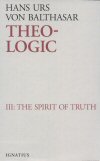
The final volume of the Theo-Logic focuses on the work of the Holy Spirit. Though Balthasar devotes some thought to the relations within the Trinity and to the problem of the filioque, he spends the better part of the volume presenting his ideas of the objective and subjective aspects of the Spirit’s person and work.

The great trilogy of theology by Hans Urs von Balthasar includes The Glory of the Lord, Theo-Drama, and Theo-Logic. His Epilogue, a single volume, is the closing of his masterwork, giving final details and overview to the prior volumes in the trilogy.
Hans Urs von Balthasar (1905–1988) was a Swiss theologian, considered to be one of the most important Catholic intellectuals and writers of the twentieth century. He studied in Vienna, Berlin, and Zurich, and completed his doctorate in German literature in 1928. Incredibly prolific and diverse, he wrote over 100 books and hundreds of articles. Although the Balthasar’s studies are diverse and scattered, his theology and philosophies are stirring, practical, and profound. He was drawn towards the spiritual and mystical theology of the Church Fathers, deferring to Scripture and patristic writers to answer modernist and neo-scholastic questions. During his life, he was both a diocesan priest and a Jesuit instructor. He was nominated to be a cardinal of the Catholic Church by Pope John Paul II himself, but Balthasar died two days before his ceremony.
Reviews
2 ratings

David W Warner
2/16/2014
Great work of theology but be forewarned - as of this writing, at least in vol 1 of the Glory of the Lord, links to Denzinger are non-existent, instead showing as links to dates (viz.p. 153).Michael Maria Waldstein
8/25/2013
Rodolfo B Garcia
7/21/2013